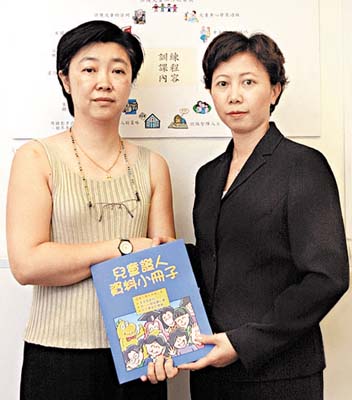Witness Support Programme alleviates trauma of child abuse victims
These volunteers, totalling 24, have been providing unpaid support service to children since November 1996 following the amendment of the Criminal Procedure Ordinance in 1995 and a landmark direction of the Chief Justice in February 1996 that a child witness may be accompanied by a "support person".
This is aimed at giving children emotional support and practical assistance, and to alleviate pressure of anxiety while giving evidence in the courts.
The scheme, known as Witness Support Programme, was launched by the Social Welfare Department in collaboration with the Force to arrange volunteers or family aides to accompany child witnesses or mentally incapacitated persons to testify in court.

Mrs Wong (right) bids farewell to Mrs
Au
Chief Inspector of Crime Wing's Child Protection Policy Unit (CPPU), Mrs
Pallas Wong, told OffBeat that since the implementation of the programme
in November until last month, a total of 376 requests for support persons
to assist in court proceedings involving child witnesses or mentally
incapacitated persons were received by CPPU.
"The volunteers, many of whom are housewives, have sacrificed a lot of their own time to accompany the victims, many below the age of 10, to alleviate their ordeal. It has made a tremendous impact," she said.
"Because of the volunteers' support to child witnesses, out of the 376 requests for support persons, 339 or over 90 per cent of the cases were taken up by the volunteers," Mrs Wong added.
A key figure and the co-ordinator of the support programme is Mrs Lucy Au. She told OffBeat in an interview that her work involved making countless rounds of telephone calls to volunteers to find out who was available to provide support for a child witness.
"I have to be absolutely and more than 100 per cent sure that the person who agrees to provide support will be present on the date of meeting the child and during court proceedings," Mrs Au said.
"I have to be very assertive with the volunteers because if the person doesn't show up, it could affect the child's emotional stability and thereby affect the trial."
Mrs Au became a volunteer since the programme's launch, but took over the co-ordinator's role in 1998 following the departure of her predecessor. This month, Mrs Au is emigrating with her family to settle down in North America and will not be able to continue with her work. Her departure will be a sad loss to the community.
Because of her dedication and staunch support for the programme, Mrs Au was awarded the 'Chief Executive's Commendation for Community Service' last year by the Chief Executive, Mr Tung Chee Hwa.
Although she will be missed by many in the Force and her volunteer colleagues, her work will be shared by Mrs Isabella Leung and Mrs Victoria Yan, both of whom are also long standing volunteers of the programme.
Both Mrs Au and Mrs Leung said their experience over the years showed that parents were usually reluctant to allow their children to testify against relatives or neighbours in fear of retribution.
"But with excellent co-ordination between the Police and Social Welfare Department officials, and with the availability of the volunteer support programme, this inherent fear of the parents has, to a large extent, been overcome," Mrs Leung said.
Both also voiced concern on the translation ability of some court interpreters, adding that in many instances the evidence given by child victims had been affected through faulty interpretation.
"It would be frustrating to see the efforts of all those involved in trying to bring justice to molesters and other child abuse suspects washed down the drain by shoddy translation," they added.
Mrs Wong said that in order to minimize the trauma of children during investigation and prosecution processes, legislative amendments were made in 1995 to the Evidence Ordinance and the Criminal Procedure Ordinance - aimed at giving better protection to three types of vulnerable witnesses, namely child witnesses, mentally incapacitated persons and witnesses who fear giving evidence in court.
Generally, the amendments allow children to give unsworn evidence in court, permitting video recording of an interview with a child victim to be presented in court and also permit a child witness to give evidence during court proceedings by way of closed circuit TV link.
"We will continue working closely with the volunteers, train more quality volunteers and organize more refresher courses for them to enhance their ability in the provision of support service to the child victims," Mrs Wong said.
"I would also like to take this opportunity to thank all the support persons, especially Mrs Au for her wholehearted support and invaluable contribution to child protection work in Hong Kong," she added.